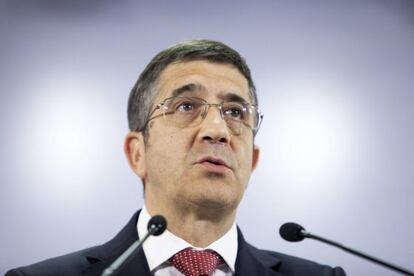Basque premier calls early elections
Nationalists and radical left expected to sweep the board in October Basques need to choose “a model to escape the financial crisis," says regional leader

The Socialist regional premier of the Basque Country, Patxi López, has called early elections for October 21, a day after the first anniversary of ETA’s unilateral ceasefire.
“We have already adopted the anti-crisis measures and we have guaranteed that the most disadvantaged will not suffer,” López said on Tuesday morning. “The Basque Country is a more modern and freer country than in 2009. We have done what we promised. We have brought terrorism to an end, we have returned Euskadi to normality and we have guaranteed a high level of public services, leaving behind the permanent confrontation [of the Basque nationalists].”
López denied there was an economic motive behind the decision to call voters to the ballot boxes, saying simply that Basques need to choose “a model” to escape the financial crisis.
López’s position as Basque leader has been weakened by the withdrawal of support from the Popular Party
However, López’s position as Basque leader has been weakened by the withdrawal of support from the Popular Party (PP), due to his opposition to Prime Minister Mariano Rajoy’s austerity plans and the presentation of an appeal against cutbacks in health and education. The PP leader in the Basque Country, Antonio Basagoiti, had warned in April that there was a line López could not cross: namely using his position as regional premier to “challenge PP policies.” The PP broke off its pact with the Socialists in May, leading to calls from opposition parties for López to announce early elections.
López was installed as regional premier, or lehendakari, in 2009, following a deal with the conservatives after the Basque Nationalist Party (PNV) narrowly failed to garner enough votes for a majority. According to the latest polls, the PNV will win the next election, albeit with a small advantage over the radical abertzale separatist coalition Bildu, which received 26 percent of the vote at the May 2011 regional elections. However, the polls were conducted before the abertzale announced its candidate for the lehendakaritza, the respected author and academic Laura Mintegi.
Although the Socialists could conceivably make pacts with the PNV, and — a more remote possibility — the abertzale, they would have to conform to being the third power in the region, and without the clout offered by López’s position.
The lehendakari has been mentioned as a possible leader of the national Socialist Party
The probable loss of his office — according to the same polls, the Socialists can expect 108,000 fewer votes in October — may damage his political career. The lehendakari has been mentioned as a possible leader of the national Socialist Party, but without the media coverage the premiership of Spain’s most volatile region offers he runs the risk of slipping off the radar.
For the Popular Party the Basque elections will be an indicator of public discontent over the central government’s austerity measures. It is widely anticipated that voters will make the PP suffer in the region, with elections in Galicia, a party stronghold, to follow shortly afterward. The Basque ballots will likely coincide with a full European bailout for Spain and the announcement of the state budget for 2013, which will certainly not bring any cheer to ordinary voters. The government will also have to contend with a reinvigorated Basque left, which will force the debate over ETA prisoners to the fore, and possible tensions in Catalonia over the Basque region’s fiscal autonomy, an arrangement that the CiU-led region would like extended to its borders. The government will have to tread carefully on that issue as CiU could also call early elections if it perceives it is being handled roughly by Madrid.
Tu suscripción se está usando en otro dispositivo
¿Quieres añadir otro usuario a tu suscripción?
Si continúas leyendo en este dispositivo, no se podrá leer en el otro.
FlechaTu suscripción se está usando en otro dispositivo y solo puedes acceder a EL PAÍS desde un dispositivo a la vez.
Si quieres compartir tu cuenta, cambia tu suscripción a la modalidad Premium, así podrás añadir otro usuario. Cada uno accederá con su propia cuenta de email, lo que os permitirá personalizar vuestra experiencia en EL PAÍS.
¿Tienes una suscripción de empresa? Accede aquí para contratar más cuentas.
En el caso de no saber quién está usando tu cuenta, te recomendamos cambiar tu contraseña aquí.
Si decides continuar compartiendo tu cuenta, este mensaje se mostrará en tu dispositivo y en el de la otra persona que está usando tu cuenta de forma indefinida, afectando a tu experiencia de lectura. Puedes consultar aquí los términos y condiciones de la suscripción digital.








































